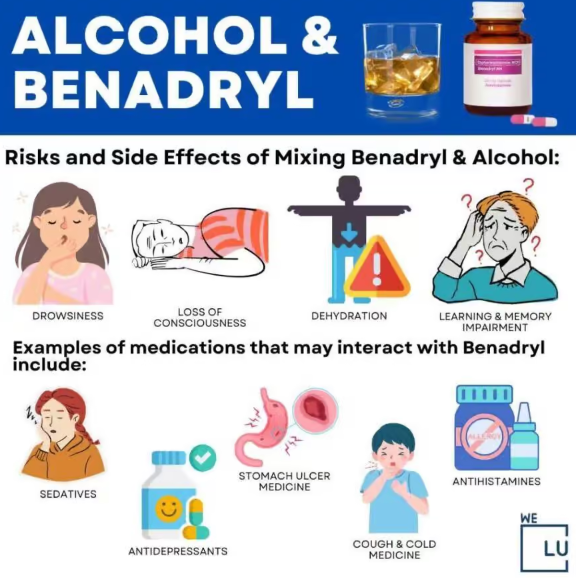BOURSESSENEGAL – Combining Benadryl and alcohol can pose significant health risks that many people may not fully understand. Benadryl, an antihistamine commonly used to relieve allergy symptoms, has sedative properties that can intensify when mixed with alcohol. This article will explore the dangers, side effects, and precautions associated with this combination. By the end, you’ll have a clearer understanding of why it’s crucial to avoid mixing these substances.
What Is Benadryl?
Benadryl, or diphenhydramine, belongs to a class of medications called antihistamines. People primarily use it to treat allergy symptoms, such as sneezing, runny nose, and itching. Additionally, Benadryl can help with insomnia due to its sedative effects. While it can be effective for these purposes, understanding its interactions with other substances, especially alcohol, is essential.
Common Uses of Benadryl
- Allergy Relief: It alleviates symptoms like nasal congestion and itchy eyes.
- Sleep Aid: Many people use Benadryl as a sleep aid due to its drowsiness-inducing effects.
- Motion Sickness: It can prevent nausea and vomiting associated with motion sickness.
Understanding Alcohol
Alcohol is a widely consumed substance that can have various effects on the body, depending on the amount consumed and individual tolerance levels. Moderate alcohol consumption might be safe for some, but excessive drinking can lead to significant health problems.
Types of Alcohol
- Beer: Contains lower alcohol content, often consumed in larger quantities.
- Wine: Typically has a higher alcohol content than beer but is often consumed in moderation.
- Spirits: These have the highest alcohol content and can lead to rapid intoxication if not consumed carefully.
Why Mixing Benadryl and Alcohol Is Dangerous
Combining Benadryl and alcohol can create a range of harmful effects on the body. Both substances depress the central nervous system (CNS), leading to increased sedation and impairment. This combination can result in:
Increased Drowsiness and Sedation
Both Benadryl and alcohol can cause drowsiness. When taken together, their sedative effects amplify, leading to severe drowsiness, confusion, or even loss of consciousness. This increased sedation can impair your ability to perform tasks that require full attention, such as driving.
Risk of Respiratory Depression
One of the most dangerous consequences of mixing these substances is the risk of respiratory depression. Both Benadryl and alcohol can slow down breathing. When combined, this effect can become severe, potentially leading to respiratory failure, which can be life-threatening.
Impaired Coordination and Judgment
Both substances can affect motor skills and decision-making. Mixing them increases the likelihood of accidents and injuries. People may find themselves in risky situations due to impaired judgment, leading to dangerous choices they might not otherwise make.
Side Effects of Benadryl
While Benadryl can effectively relieve allergy symptoms, it also comes with potential side effects. Understanding these side effects can help you gauge the risks associated with using this medication, especially when mixed with alcohol.
Common Side Effects
- Drowsiness: As mentioned, this is one of the primary effects.
- Dry Mouth: Many users report experiencing a dry mouth sensation.
- Dizziness: Some may feel lightheaded or dizzy after taking Benadryl.
- Constipation: It can affect the digestive system, leading to constipation in some individuals.
Serious Side Effects
In rare cases, Benadryl can lead to more severe reactions, including:
- Rapid Heartbeat: Some individuals may experience an increased heart rate.
- Confusion: Especially in older adults, confusion can be a concerning side effect.
- Allergic Reactions: Though uncommon, some people may have severe allergic reactions.
Alcohol’s Effects on the Body
Alcohol affects everyone differently. While moderate drinking may have fewer consequences for some, others may experience adverse effects even with small amounts. Understanding these effects can help clarify the risks of combining alcohol with Benadryl.
Short-Term Effects of Alcohol
- Euphoria: Many people initially feel relaxed and euphoric.
- Impaired Judgment: Alcohol can significantly impair decision-making abilities.
- Decreased Coordination: Fine motor skills become compromised with alcohol consumption.
Long-Term Effects of Alcohol
- Dependency: Regular alcohol use can lead to addiction or dependency.
- Liver Damage: Chronic drinking can cause severe liver conditions.
- Cognitive Decline: Long-term use can negatively impact memory and cognition.
Safety Precautions When Taking Benadryl
If you’re considering taking Benadryl, it’s essential to take safety precautions, especially regarding alcohol consumption. Here are some guidelines to follow:
Read Labels Carefully
Always check the labels of both Benadryl and any alcoholic beverages. Many over-the-counter medications, including cold and allergy remedies, may contain ingredients that can interact with alcohol.
Avoid Mixing Substances
If you’ve consumed alcohol, wait before taking Benadryl. A good rule of thumb is to wait at least 24 hours after drinking before using this medication.
Consult a Healthcare Professional
If you’re unsure about using Benadryl or mixing it with other substances, consult a healthcare provider. They can provide personalized advice based on your medical history and current medications.
Conclusion: Prioritize Your Safety
Mixing Benadryl and alcohol can lead to serious health risks, including increased sedation, respiratory depression, and impaired coordination. Understanding the dangers of this combination is crucial for making informed decisions about your health. If you need to take Benadryl, always prioritize safety and avoid alcohol to ensure your well-being.
By taking these precautions and being aware of the potential risks, you can enjoy the benefits of Benadryl without compromising your health. Stay informed and make choices that support a healthier, safer lifestyle. Your body will thank you for it!
REFERENCE : https://www.health.com/



